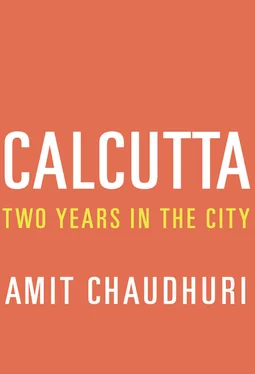Basu points to the equivocal bhadralok origins of the Bengali left. Just as many Indians discovered India’s civilisation and heritage abroad, often directed to it by some British Indophile, Basu was converted to communism in London, where, studying in the thirties to be a barrister at the Middle Temple, he fell under the spell of the Marxist Rajani Palme Dutt.
He seldom smiled; when he disagreed with someone, or when he encountered any disapproval of his regime, the nostrils of his thin nose flared slightly. His seriousness wasn’t inscrutability or aggression; it was partly, I think, a pose, the wishful intensity of a romantic. This unadmitted- to romanticism, besides genetic predisposition, might well have been what kept him youthful. But towards interviewers and journalists, he could be patrician, as if they needed to be held in check with steely displeasure. More than ideology, it was Bengali puritanism, which was engendered in the early nineteenth century through Brahmo unitarianism and Hindu reform, and which abhorred, at once, religious profusion and bad taste, which made that face, with its gaunt lines, its air of intellect, its deep gaze behind the glasses, both charismatic and forbidding. No wonder he made my mother, who is torn between puritanism and abandon herself, uncomfortable. By the late 1990s, a few years before Basu resigned from the chief ministership, and as he became frail, the skull emerged more clearly, and the face, now a thin, stubborn covering of skin, still unsmiling, and with less and less reason to smile, became a mask — an attenuated, immutable outline of the earlier face.
Under this man, agrarian, rural Bengal finally, and astonishingly, received justice in the late seventies and early eighties, as peasants and sharecroppers were empowered and accorded the rights long due to them, and landlords curtailed; under him, Calcutta became an abandoned and unimportant city. A democratising neglect, a suspicion of elite institutions, like Presidency College, and an inexorable winding down, is what Calcutta got after the trauma of the Naxal uprising and Congress dishonesty and mismanagement, and in exchange for unshakable Left Front stability. It was a confusing time. It would take much more than a decade for people in Calcutta to understand that this period — the eighties and early nineties — was one in which they lost face, lost, too, the easy access to intellectual prestige they took to be a law of nature, and that it was then that Calcutta gave up its pre-eminence as India’s most interesting, pulsating metropolis. I didn’t live here then; from my visits, I recall disorder, extraordinary abeyances in the twenty-four hours that comprise a day when there was no electricity; and I recall the rise of a busy new saint-at-large called Mother Teresa.
Dourly, Basu presided over this era — which also saw the collapse of the Berlin Wall, the anomalous rise of state capitalism in China, the dissolution of the Soviet Union, and the liberalisation of India’s economic policy. Everything he — and, for that matter, any middle-class person from anywhere — took to be eternal and changeless was being dismantled. Basu couldn’t have liked that. Momentarily, I remember, he even took refuge in the persona of the bhadralok, when he said of Rajiv Gandhi, “We understand each other, because we are both gentlemen.” Nor could he have liked the unending power cuts at home, when people began to call him Andhakar Basu. For his name, like the names of many Bengalis carrying the legacy of the so-called nineteenth-century enlightenment in Bengal, means “light.” That light — of reason, rationality, advancement — always carried with it, as we see from today’s Calcutta, its own darkness.
It was Basu’s successors — the next chief minister, Buddhadeb Bhattacharya; Nirupam Sen, whom I was about to meet — who had to speak, for the first time, the language of self-criticism in public: “We have made mistakes; we have to change.” Basu never had to adopt this tone; it wouldn’t have suited a Marxist of his generation. The only time he complained about the Party was when the politburo kept him from accepting the offer of becoming the prime minister of India, at the helm of the victorious United Front government in 1996: he called it a “historic blunder,” surprising everyone that a politburo member (such as he was) could actually voice a personal opinion. People had almost forgotten that he was an individual, a human being with desires; yet, on the whole, he was respected for his aloofness. It was better, I suppose, to have a man like him oversee, and in some way facilitate, the decline of Calcutta, rather than a man who was not a bhadralok: a semi-literate Bengali, say, with a hustler’s background, like some of the politicians today, or a suburban communist in a hat, like Subhash Chakrabarty. Or was it?
I was surprised at the bitterness and anger voiced about Basu after his death. None of it had found expression in his lifetime, perhaps because people were nervous of his glare. Or perhaps, by January 2010, when Basu died, people realised what had happened to Bengal. And they were harsh on the man: but the harsh words came only when he was properly out of earshot.
Manoj, less like a friend than a man on a stealth mission, picked me up in his car and took me to a building on Camac Street which I’ve often gone past and fleetingly wondered about. It’s relatively new, about ten years old, but it’s neither a shopping mall nor a nursing home. The minister for commerce and industry had his office here on the seventh floor.
Nirupam Sen sat behind a large desk in a hushed air-conditioned room, his chair swathed, as the chairs of bureaucrats and ministers often are, in a white towel. This measure is probably taken to protect the chair from its occupant’s unwitting markings: middle-class Indians can have a touching reverence for furniture, and will conceal certain presumably treasured objects with a small piece of cloth from the dust and the environment. Or was it a kind of official symbolism, the spotlessness of the towel a kind of moral statement? For the towel to look clean, it itself must be invisibly tended to.
Sen hadn’t forgotten me; he was his usual undemonstrative, unpretentious self. I was nervous that I was encroaching; a few days remained until the elections, which would cover Bengal in phases. Burdwan constituency, of which Sen was the representative, would vote before Calcutta. Yet Sen wasn’t hurried or impatient, and our conversation lasted two hours — probably because nothing of great importance emerged from it. Mainly, it was a familiar — but no less painful for being familiar — account of how Bengal had been deliberately marginalised after Independence by the central government, first of all by the Freight Equalisation Policy of 1948, which involved subsidising the transportation of minerals to any part of India by the central government, so that a factory dependent on those minerals wouldn’t suffer in terms of costs even if it were set up in a place far from their source. The greatest beneficiaries were states like Maharashtra and Gujarat in the West; and Delhi and its environs. The mineral-rich states, like Bengal and Bihar, lost their natural advantage, and their economies were badly damaged. All this was as well known as Sita’s abduction by Ravana in the Ramayana ; but Sen spoke of it and other bygone discriminatory policies as if the wound were fresh, just as devotees can get worked up each time they hear the abduction episode.
He also told me — upon my asking — a little bit of his personal history; how, born in 1946 in Burdwan, one of a family of seven siblings, he grew up in poverty, presumably as the family profession by caste —kobiraji , or traditional medicine — became irrelevant. His father, he said, had in fact started out on the path of being an allopathic doctor, been admitted to medical college, and then had to give it up on the death of his father. So Sen’s father became a schoolteacher, and then joined the Communist Party in the early forties, involving himself in famine relief during that infamous man-made famine in 1943, caused by a combination of food supplies being diverted to Tommies and local wholesalers hoarding grain, in the last years of British rule. Sen, with his dark, long, bespectacled face, his expression in turn attentive and earnest, looks like a schoolteacher himself, but, by his own admission, was never interested in academics — probably because of his involvement in politics from 1961. And he may never have got married (he’d decided no woman in her right mind could possibly entertain the thought of such a husband) had not his wife, whom he met in college, taken the initiative and as good as proposed to him. Although Sen isn’t the sort of man you’d associate with excitement, you realise from throwaway remarks — for instance, about the “debate” about various things in the sixties — that he’s part of a culture that’s quickened by political disagreement and oppositionality. When he refers to the various criticisms now directed at the CPI(M), he refers to this culture in a general, axiomatic way: “Everyone in Bengal talks about politics,” he says, “just as everyone here is a doctor.” By this he means that everyone has a ready diagnosis for a problem, or an ailment, in Bengal. He attributes this to Bengal’s history of “social consciousness.” He doesn’t add that only in a society in which everyone is a patient — a society of hypochondriacs — would everyone be a doctor; that one must feel constantly victimised and arraigned by politics to be a society of potential politicians. As I listen, I see overlaps with my father and my uncles (Sen’s father, too, went to Scottish Church College); but, just as Socrates claimed he was not a citizen of Athens or Greece, but of the world, I can imagine my father and uncles and their friends as people who belong to the world, and not just Sylhet. In Sen, I see the Bengal of the last thirty years more clearly — its smouldering pain; its ordinariness: I can’t think of him belonging elsewhere.
Читать дальше












